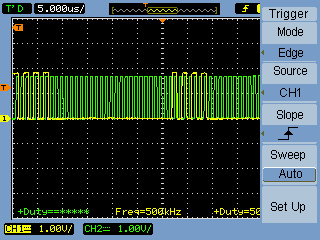Hi,
I am using the nRF52832 on a custom PCB and I am interfacing it with a flash memory chip through SPI.
I am testing the SPI communication using the spi example (nRF52 SDK 14.2.0\examples\peripheral\spi).
Using an oscilloscope I can see that each transmitted byte (from m_tx_buf) is followed by 24 clock cycles during which the MOSI line is low.
I would like to know how to transmit continuously, without these 24 additional clock cycles.
I have tried to feed nrf_drv_spi_transfer with a NULL pointer for the rx buffer, so that no rx is expected, but nothing changed.
Here is main.c:
And here are the oscilloscope traces (the yellow one is MOSI and the green one is SCK):

As mentioned above, the transmitted byte 10101010 is followed by 24 clock cycles where MOSI is low.
Thank you in advance for your help.

